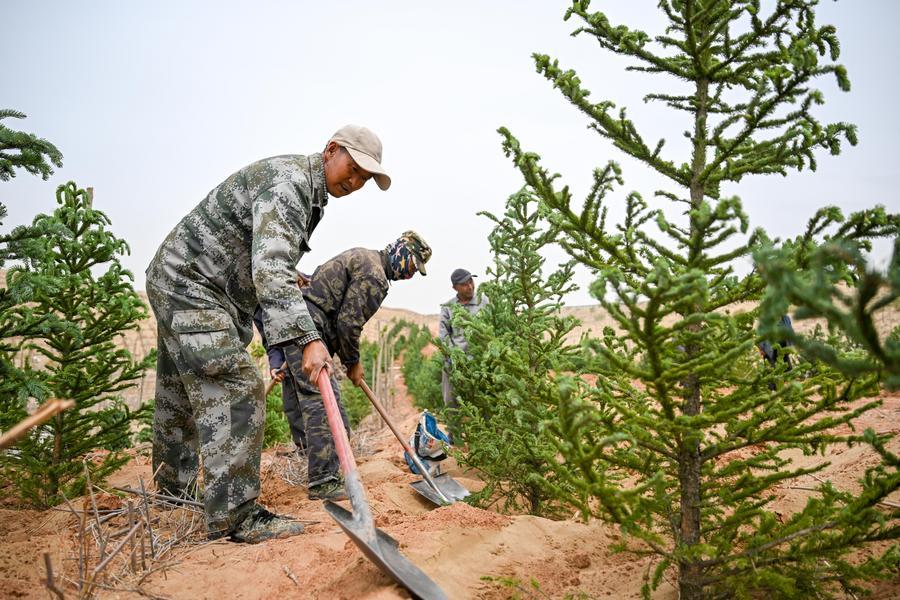
 0 Comment(s)
0 Comment(s) Print
Print E-mail Xinhua, July 14, 2024
E-mail Xinhua, July 14, 2024
Workers plant tree seedlings along a road across the Kubuqi desert in Hangjin Banner, north China's Inner Mongolia Autonomous Region, on May 29, 2024. (Xinhua/Lian Zhen)
China's remarkable strides in combating desertification have been highlighted on International Day of Combating Sand and Dust Storms, on Friday.
Over the past two decades, the country has witnessed a significant decline in the frequency and intensity of spring sandstorms, a testament to its robust ecological initiatives.
The National Forestry and Grassland Administration on Friday revealed a substantial reduction in the number of spring sandstorms, from an average of 17 times a year between 1981 and 2010 to 9.2 times in the last decade, nosediving about 46 percent.
Since the 18th National Congress of the Communist Party of China in 2012, the country has intensified support for key ecological projects such as the Three-North Shelterbelt Forest Program (TSFP).
Such efforts have led to the successful management of 331 million mu (about 22 million hectares) of desertified land, with 53 percent of the treatable desertified areas now under effective control.
China, one of the nations most affected by desertification, has been grappling with the transformation of fertile lands into deserts, a phenomenon that disrupts rainfall patterns and exacerbates extreme weather events, further driving climate change.
The World Atlas of Desertification warns that 75 percent of the world's soils are already degraded, affecting 3.2 billion people globally. Projections by the United Nations Educational, Scientific and Cultural Organization (UNESCO) are dire, with 90 percent of the planet's land surface at risk of degradation by 2050, posing significant threats to biodiversity and human life.
In stark contrast to this global outlook, China has achieved zero growth in land degradation and has successfully reduced the area of desertified and sandy lands.
A 2020 report from the Chinese Academy of Sciences indicated that China had achieved land degradation neutrality, with the net land restoration area accounting for over 18 percent of the world's total, placing it at the forefront of global efforts in this regard.
The TSFP, the world's largest afforestation project, serves as a good example. Launched in 1978 and scheduled to be completed in 2050, it has already helped safeguard the land inhabited by people in the northwest, north and northeast of China.
By 2020, the program saw the preservation of 480 million mu of forested land, the management of 1.28 billion mu of degraded grasslands, and the forest coverage rate increased from around 5 percent in 1978 to about 14 percent.
In June 2023, China proposed that the TSFP be turned into a fully functional, unbreakable "green Great Wall" and ecological security barrier in northern China.
As the International Day for the Prevention of Desertification and Land Degradation aims to galvanize a global sense of duty and urgency, China has emerged as a dynamic force in fulfilling its commitments to the United Nations Convention to Combat Desertification.
On Wednesday, the United Nations General Assembly designated 2025-2034 as the "United Nations Decade on Combating Sand and Dust Storms."
Introducing the text of a draft resolution on behalf of the Group of 77 developing countries and China, the representative of Uganda said sand and dust storms are an issue of international concern.
The storms increasingly threaten achievement of 11 of the 17 UN Sustainable Development Goals, he stressed, adding that the resolution aims to enhance international and regional cooperation to prevent, halt and mitigate their effects.